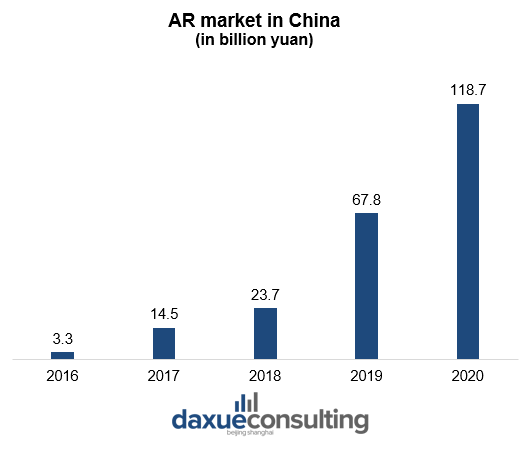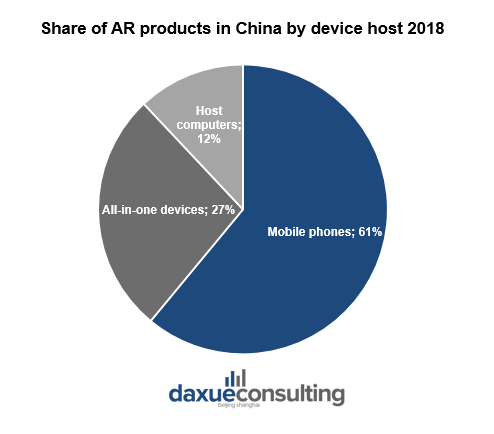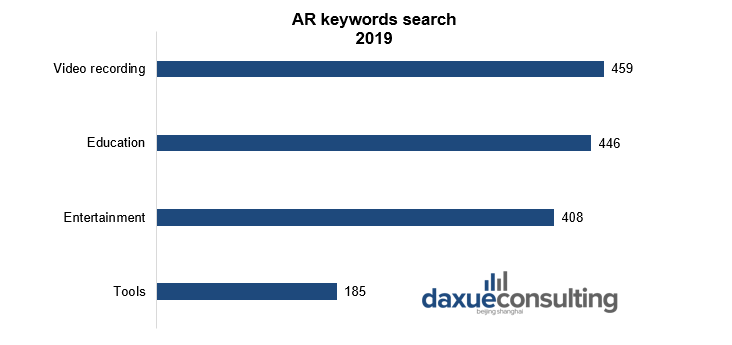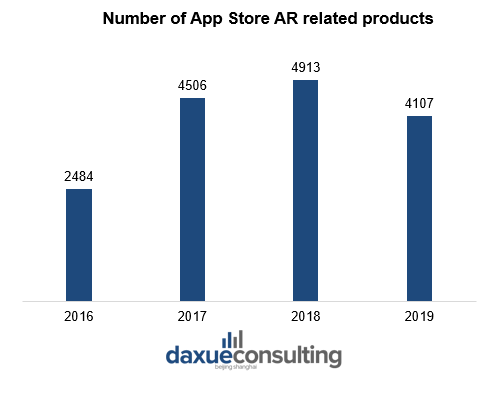The augmented reality (AR) market in China has gone through a period of rapid development for more than 20 years. In 2016, the scale of the AR in China was approximately 3.3 billion yuan. It reached 14.5 billion yuan in 2017, a year-on-year increase of 329.2%. In 2020, the market exceeded 118.7 billion yuan.

Augmented Reality (AR) is a technology that combines virtual information with the real world. It uses various technical tools such as multimedia, 3D modeling, real-time tracking and registration, intelligent interaction and sensing to generate computer data. Once virtual information such as text, image, 3D model, music, video is modeled, it is applied to the real world.
Production of AR technology in China
The shipments of AR hardware in China in 2018 were about 730,000 units, of which mobile phones accounted for 60.9% of all shipments. Among them, all-in-one devices and host-based shipments were 196 thousand units and 89 thousand units respectively, accounting for 26.8% and 12.2%. We can see that the proportion of mobile phone products occupies an absolute position, and in the future, mobile phones in China will also be the key layout objects in the competition on the AR market.

According to IDC’s forecast, by 2022, the overall shipments of hardware for AR/VR in China will reach 66 million units. Among them, AR hardware products will account for about 40% of the AR/VR market. In the future, as AR technology matures, the unit price of AR hardware products will decline.
Key spheres of AR in China
In 2019, from the perspective of global mobile AR applications by industry, retail shopping accounted for 30%, education for 24%, game entertainment for 15%, advertising and marketing for 11%, information display for 7%, industrial manufacturing for 3%, and others for 10%
In the same year, the keywords most frequently searched by users when typing AR-related products were mainly in the categories of video recording, education and entertainment.

Two parts of the AR market in China
The AR market can be divided into hardware and software. The hardware suppliers include chip manufacturers occupying the top of the value chain. They are the starting point for AR device manufacturing. They are responsible for providing processors, sensors, display devices, power supplies and other products for AR device manufacturers.
According insights Eloi Gerard, the CEO and co-founder ofShanghai-based XR studio CrowsNest, shared during an episode of Daxue Talks: “China is good at AR hardware. It can do hardware more efficiently and faster than the Americans”.
Software vendors and content producers provide AR device manufacturers with customized products and services (such as AR SDK development kits, application software, cloud services, etc.). They also directly face individual users or corporate users.
Mobile phones are the driving force of AR in China
The development of the smartphone industry has promoted the decline in the price, size and performance of display devices and sensors, laying a solid technical foundation for the popularization of VR/AR products in China
According to Qianzhan, the number of App Store AR-related products generally fluctuated and increased during the period from 2011 to 2019. In 2019, the number of App Store AR related products reached 4107, a year-on-year decrease of 16.4%.

According to statistics, App Store AR game products include three types: casual games, action games and adventure games. From 2016 to 2019, the number of App Store AR game products reached the highest value in the past four years. In 2019, App Store had 60 AR casual and action games, and 42 adventure games.
AR investments in China
According to Huajing Information Network, as of 2019, the amount of investment and financing of AR in China was 2.6 billion yuan and 13 financing events in China’s AR industry happened that year.
AR-related investment in the Chinese market in 2020 reached US$4.09 billion, an increase of 65.9% year-on-year from 2019, which is higher than the global average increaseAt the same time, China’s total AR market in 2020 accounted for 38.3% of the global market share, making it the largest country in terms of expenditure, followed by the United States, Western Europe and Japan.
From the perspective of investment value and technology maturity, the key investment areas in the AR in China in 2019 were AR browsers, navigation ARApp, and educational AR hardware. In the long run, computer vision technology and automotive head-up display (HUD) will get the biggest investment value.
How Chinese companies embrace AR development
After years of market cultivation, AR technology is being applied to various business scenarios. Tan Li, director of the AR/VR technology department of JD.com’s retail technology and data center, said recently that JD.com has applied AR technology. It also was the first company in the industry to apply AR to the e-commerce scenarios in China. So far, JD AR have accumulated more than 100 million users.
NetEase Advanced Technology is another company focusing on AR in China, which was incubated under NetEase Artificial Intelligence. It has built “NetEase AR”, the earliest planned and most complete AR platform among domestic Internet giants. In June 2020, NetEase Advanced Technology announced the completion of the first round of AR financing of more than 100 million yuan.
Chinese AR software makers such as Sight Plus and Hisense have released SDKs as alternatives to their overseas counterparts Metaio and Wikitude. With the activation of domestic players, experts believe for the first time that China will become the world leader in the industry, rather than catching up, as it has done in other technology-related industries.
The impact of 5G on AR in China
5G’s high-speed and low-latency transmission characteristics make it possible to achieve truly stable millisecond-level real-time data synchronization. 5G is the foundation of AR popularization. 5G will bring revolutionary changes to AR in China. In order to promote the layout of AR technology industry chain, China Unicom 5G Innovation Center decided to jointly promote AR business platform cooperation with more than 30 companies.
The development of 5G in China helps to expand AR services. For example, the current mini-program + AR has simplified the burden of APP and diversified its gameplay.
What we may see in the future of AR in China
Mobile AR 2.0 is coming
As the next-generation AR cloud-supported software development kit (SDK) released at the end of 2019, we can expect to see richer interaction, persistence, global mapping, and multi-user functions, which will lead to a significant improvement in the AR ecosystem.
AR provides solutions for indoor navigation

One of the most common applications of AR technology is indoor navigation. In 2019, ordinary consumers truly experienced the application of AR in this area for the first time. People have widely used Google and Apple’s map services in outdoor activities, and AR will become an application for indoor navigation.
AR can be useful to indoor navigation in airports, shopping malls, hospitals and office parks. For example, the Gatwick Airport in London has deployed its own smart phone solution to provide routes to the terminal and gate based on the user’s flight number.
AR in new retail
Forecasts show that at least 100 million users in China used AR-enabled shopping technology in 2019, which was one of the hottest retail trends in 2019. The vigorous development of mobile devices using augmented reality technology means that this field is currently has robust and mature technologies. Developers, retailers, and customers can now easily use it as part of their daily experience.





